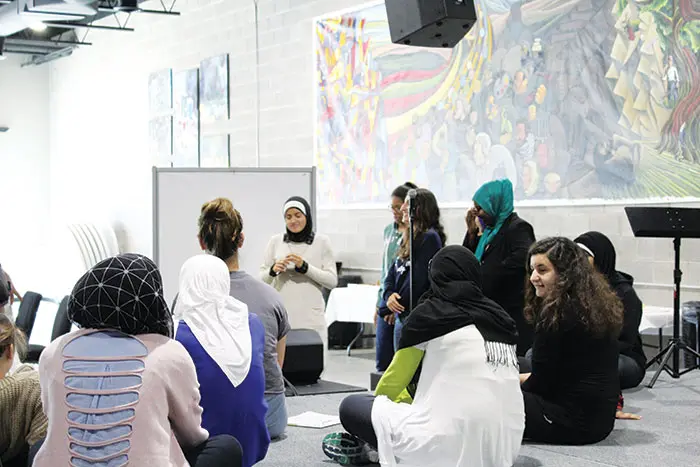
|
| Young women participate in the Arab American National Museum’s “Reel Stories” filmmaking program. |
DEARBORN — The Arab American National Museum is empowering young women through a filmmaking program that creates a diverse, collaborative setting, where innovation and commitment are key components to success.
“Reel Stories: Empowering Young Women Through the Art of Filmmaking” is a free class where 20 girls from Metro Detroit, ages 14 to 17, develop skills as writers, editors, directors and actors by collaborating with one another, program directors and guest speakers to produce a film that will be displayed in an exhibition at the museum next spring.
The program directors wanted, “something innovative, something that empowers young women and girls and also something that can give them a skill-based experience that they can carry on into the future,” said Isra El-beshir, curator of Education and Public Programming, who is also overseeing the grant for the project.
The program is the product of a grant from Museums Connect, an initiative of the U.S. Department of State’s Bureau of Educational and Cultural Affairs.
“The idea is that a U.S. museum or cultural institution will partner with a non-U.S. museum and they would work together on this project,” El-beshir said. “Before we picked the idea of Reel Stories, we were looking at other museums outside of the U.S. who share our mission.”
For this year’s project, the Arab American National Museum is working alongside the Palestinian Heritage Museum in East Jerusalem, whose mission statement is closely aligned with the Arab American National Museum’s.
“Our mission is very clear,” El-beshir said. “It’s to document, preserve and present the history, culture and contributions of Arab Americans. The Palestinian Heritage Museum is very similar in that they’re celebrating the culture, heritage and contributions of Palestinians.”
The young women from Metro Detroit collaborate with the 20 young women from East Jerusalem who are also participating in the program through Facebook.
According to El-beshir, the girls not only develop and construct new ideas with each other, but they also build relationships and share life experiences.
She said the young women in the program are extending their network and community in a country that they’ve never been to and with which they never thought they would have connections.
“They’re talking to these girls through Facebook and making friends and talking about not just the project, but what their daily life is like,” she said. “They’re having these dialogues, expanding their worldview and increasing their cultural competency; and that’s empowering.”
Apart from the cultural diversity that comes from learning about a new country, there is also a range of different races, religions and cultures among the group of young women in the Detroit area. South Asians, African Americans, Arab Americans, Caucasians and Latinas, coming from distinct socioeconomic backgrounds and cultures, adds to the group’s variety.
“You have all these girls that are together in a circle and they are sharing their life ideas; they’re collaborating based on their experiences,” El-beshir said. “They’re listening to one another and they are from different walks of life. They talk about how impactful that is, because they don’t get to talk about that in the schools that they’re in or in the communities they’re in. This is extremely diverse and they’re excited to have that opportunity.”
The girls involved in “Reel Stories” were chosen through an application process that involved an essay in which applicants showed their willingness to commit to the program. Particularly, El-beshir said the directors were looking for young women who had a strong interest in some part of the filmmaking process, the arts or female empowerment, and who would stay committed throughout the project’s duration from October through March. The young women meet every Saturday from 10 a.m. to 2 p.m.
Near the end of the program, a few girls who are 16-years-old or older will head to East Jerusalem with staff members. The cost of the journey limits the number of girls who can go. El-beshir said the decision of who to take will be difficult.
“It’s based on your level of commitment, leadership and how you contributed,” she said. “We want this to be a reward for those who have really stepped up to the plate and have proven growth throughout the process. And they’ve all done that, so this is going to be extremely difficult.”
In May, a group of five girls and two staff members from East Jerusalem will come to Dearborn, during which time a special screening of the film produced by the American students will be shown, along with a panel discussion.
The film will be shown at the Arab American National Museum from April- June.






Leave a Reply